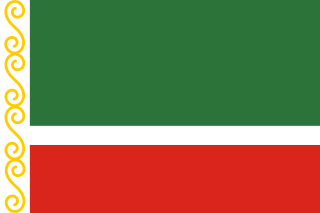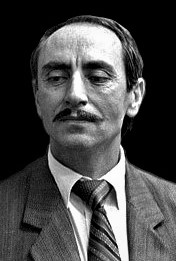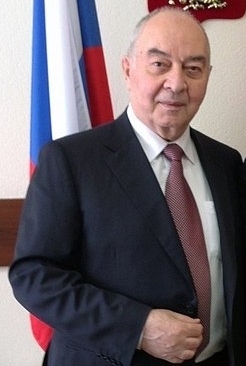
Chechnya, officially the Chechen Republic, is a republic of Russia. It is situated in the North Caucasus of Eastern Europe, between the Caspian Sea and Black Sea. The republic forms a part of the North Caucasian Federal District, and shares land borders with Georgia to its south; with the Russian republics of Dagestan, Ingushetia, and North Ossetia–Alania to its east, north, and west; and with Stavropol Krai to its northwest.

Grozny is the capital city of Chechnya, Russia.

The First Chechen War, also referred to as the First Russo-Chechen War, was a struggle for independence waged by the Chechen Republic of Ichkeria against the Russian Federation from 11 December 1994 to 31 August 1996. This conflict was preceded by the battle of Grozny in November 1994, during which Russia covertly sought to overthrow the new Chechen government. Following the intense Battle of Grozny in 1994–1995, which concluded with a pyrrhic victory for the Russian federal forces, Russia's subsequent efforts to establish control over the remaining lowlands and mountainous regions of Chechnya were met with fierce resistance and frequent surprise raids by Chechen guerrillas. The recapture of Grozny in 1996 played a part in the Khasavyurt Accord (ceasefire), and the signing of the 1997 Russia–Chechnya Peace Treaty.

Akhmat-Khadzhi Abdulkhamidovich Kadyrov was a Russian politician and revolutionary who served as Chief Mufti of the Chechen Republic of Ichkeria in the 1990s during and after the First Chechen War. At the outbreak of the Second Chechen War he switched sides, offering his service to the Russian government, and later became the President of the Chechen Republic from 5 October 2003, having acted as head of administration since July 2000.
The history of Chechnya may refer to the history of the Chechens, of their land Chechnya, or of the land of Ichkeria.

Dzhokhar Musayevich Dudayev was a Chechen politician, statesman and military leader of the 1990s Chechen independence movement from Russia. He served as the first president of the Chechen Republic of Ichkeria from 1991 until his assassination in 1996. Dudayev had previously served as a senior officer in the Soviet Air Forces.
Said-Magomed Shamaevich Kakiyev is a colonel in the Russian Army, who was the leader of the GRU Spetsnaz Special Battalion Zapad ("West"), a Chechen military force, from 2003 to 2007. Inside Chechnya his men were sometimes referred to as the Kakievtsy. Unlike the other Chechen pro-Moscow forces in Chechnya, Kakiyev and his men are not former rebels and during the First Chechen War were some of the few Chechen militants who fought on the Russian side.

When the Soviet Union existed, different governments had ruled the northern Caucasus regions of Chechnya and Ingushetia. Within the Mountain Autonomous Socialist Soviet Republic, later annexed into the Russian Socialist Federative Soviet Republic, they were known as the Chechen Autonomous Oblast and the Ingush Autonomous Oblast, which were unified on January 15, 1934, to form the Checheno-Ingush Autonomous Oblast. It was elevated to an autonomous republic as the Checheno-Ingush Autonomous Soviet Socialist Republic from 1936 to 1944 and again from 1957 to 1993. Its capital was Grozny.

Doku Gapurovich Zavgayev is a Soviet and Russian diplomat and politician from Chechnya. He was the leader of the Checheno-Ingush ASSR.

The Chechen Republic of Ichkeria, known simply as Ichkeria, and also known as Chechnya, was a de facto state that controlled most of the former Checheno-Ingush ASSR from 1991 to 2000 and has been a government-in-exile since.

The Republic of Chechnya is a constituent republic and federal subject of the Russian Federation. It is located in the Caucasus region in southwest Russia. It is the political successor of the Checheno-Ingush Autonomous Soviet Socialist Republic. From a centralized form of government during the existence of the Soviet Union, the republic's political system went upheavals during the 1990s with the establishment of the Chechen Republic of Ichkeria, leading to the First Chechen War and the Second Chechen War which left the republic in total devastation. In 2000, following Russia's renewed rule, a local, republican form of government was established in the republic under the control of the Russian federal government.

The deportation of the Chechens and Ingush, or Ardakhar Genocide, and also known as Operation Lentil, was the Soviet forced transfer of the whole of the Vainakh populations of the North Caucasus to Central Asia on 23 February 1944, during World War II. The expulsion was ordered by NKVD chief Lavrentiy Beria after approval by Soviet leader Joseph Stalin and Anastas Mikoyan, as a part of a Soviet forced settlement program and population transfer that affected several million members of ethnic minorities in the Soviet Union between the 1930s and the 1950s.

Grozny Oblast was an administrative entity of the Russian SFSR that was established as Grozny Okrug on 7 March 1944 and abolished on 9 January 1957.

The insurgency in the North Caucasus was a low-level armed conflict between Russia and militants associated with the Caucasus Emirate and, from June 2015, the Islamic State, in the North Caucasus. It followed the (Russian-proclaimed) official end of the decade-long Second Chechen War on 16 April 2009. It attracted volunteers from the MENA region, Western Europe, and Central Asia. The Russian legislation considers the Second Chechen War and the insurgency described in this article as the same "counter-terrorist operations on the territory of the North Caucasus region".
The following is a timeline of the history of the city of Grozny, Chechen Republic, Russia.

The Chechen–Russian conflict was the centuries-long ethnic and political conflict, often armed, between the Russian, Soviet and Imperial Russian governments and various Chechen forces. The recent phase of the conflict started after the dissolution of the Soviet Union in 1991 and ended with the oppression of Chechen separatist leaders and crushing of the separatist movement in the republic proper in 2017.
The Decree of Sovereignty of the Chechen Republic was a formal declaration of independence for the autonomous Soviet Republic of Checheno-Ingush ASSR. Between 1991 and 2000 Chechnya was de facto an independent state. The declaration was issued on 1 November 1991, by the head of the All-National Congress of the Chechen People, Dzokhar Dudayev.

The Chechen genocide refers to the mass casualties suffered by the Chechen people since the beginning of the Chechen–Russian conflict in the 18th century. The term has no legal effect, although the European Parliament recognized the 1944 forced deportation of the Chechens, which killed around a third of the total Chechen population, as an act of genocide in 2004. Similarly, in 2022, the Verkhovna Rada of Ukraine condemned the "genocide of the Chechen people" by Russia during the First Chechen War and the Second Chechen War.
The Chechen Revolution was a series of anti-government protests in the Checheno-Ingush Autonomous Soviet Socialist Republic of Russian Soviet Federative Socialist Republic against the local Communist Party officials.
General elections were held in the Chechen Republic on 27 October 1991 to elect the president and parliament. The presidential election resulted in a victory for Dzokhar Dudayev.













